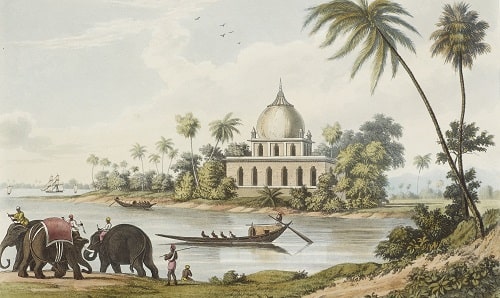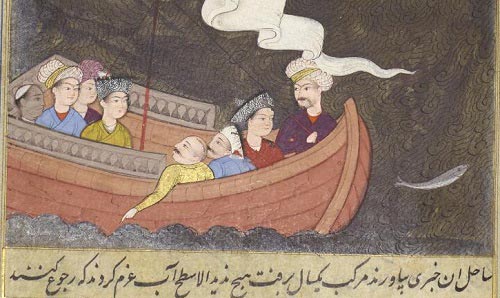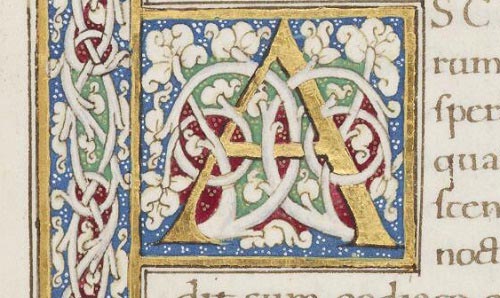
Military, Colonial and International History Collections
Primary sources for military history, colonialism and international affairs range from narrative and visual depictions of medieval warfare to archives relating to the Cold War of the late 20th century.

Our Special Collections include major printed and archival resources relating to the English Civil Wars, the Napoleonic Wars, British colonialism in Ireland, South Asia and the Caribbean, the activities of missionaries through the British Empire, and international affairs leading up to the Second World War.
Military history
A number of medieval manuscripts contain narratives of medieval warfare, as well as vivid illustrations of ancient battles in contemporary guise, in such texts as John Lydgate’s Troy Book and the Shahnameh of Persian poet Ferdowsi. Printed texts relating to warfare begin with Roberto Valturio’s De Re Militari (1472), illustrated with elaborate images of siege engines and other examples of military engineering. Other early texts can be found within the Bullock Collection and the Niccolò Machiavelli Collection, while the English Tract Collection embraces contemporary accounts of the English Civil Wars. The Library also holds numerous printed secondary sources relating to warfare throughout the ages.
Several family and estate collections contain important material relating to British military history, as a result of family members’ involvement in the military. There is significant coverage of the American War of Independence (Bagshawe Muniments); military service in Ireland in the mid-18th century (Bagshawe Muniments); the conquest and occupation of India (e.g. the East India Company Papers, Grey (Stamford) of Dunham Massey Papers, the Jackson Family Papers, the Melville Papers and the Thomas Munro Papers); the Napoleonic Wars (the Clinton Papers); the Crimean and Boer Wars (the Hibbert-Ware Papers and the Bromley Davenport Muniments); the First World War (Ashworth Cross Family Papers, Daniel Dougal Diaries, Heald-Hall Family Papers, Samuel Hird Papers, Tout Family Papers, Dame Mabel Tylecote Papers and W. M. Wills’ Home Front Diaries); and the Second World War.
Material relating to the Second World War includes the Auchinleck and Dorman O’Gowan collections (North Africa Campaign), several holdings relating to Orde Wingate and the Chindits (Burma Campaign), papers of the military historian Roger Parkinson, and confidential dispatches to the Manchester Guardian.
The massive Guardian Archive includes correspondence with the Zionist pioneer Chaim Weizmann and documents the founding of Israel and the later Middle East conflicts. The papers of Samuel Alexander (1859-1938) also contain correspondence with Weizmann, while the W. P. Crozier Papers incorporate interviews with Weizmann and other statesmen over the issue of the Jewish National Home. More recently, the Arab-Israeli conflict is documented in the Military Papers of Major-General Eric Edward Dorman O'Gowan and in the Dame Mabel Tylecote Printed Collection, which also contains material relating to the Anglo-Israel Association and the foundation of Israel.
Nashriyah, the digital Iranian history project, provides free online access to important Iranian newspapers and periodicals covering the defining moments from the premiership of Mohammad Mossadegh and the August 1953 coup d'état against his government (1950-53), the 1979 Revolution, and the late 1990s/early 2000s ‘reform era’ of former President Mohammad Khatami.
Colonialism and international affairs
The long history of European – and especially British – imperialism is well documented in our collections. In addition to the information on military campaigns recorded above, there are sources for the administration of the colonies, for the development of the economic, transport, social and missionary networks that sustained them and ensured their exploitation, and for the racial theories and stereotyping that sought to legitimise them.
Colonial history is documented in the Bowring Papers (relating to Hong Kong and China); the Carrington Papers (Ceylon/Sri Lanka); the Stapleton Manuscripts (colonial administration and slave-run plantations in Montserrat and the Leeward Islands, West Indies); the Brooke of Mere Muniments (slave-run plantations in Antigua, West Indies); the Tanks Group Archive (colonialism, exploitation and development in Central and East Africa in the first half of the 20th century); and the Grey (Stamford) of Dunham Massey Papers (India and Canada). The activities of missionaries who followed in the wake of imperial expansion are recorded in the Christian Brethren Archive (most notably in the Echoes of Service Archive and Lantern Slide Collection), and in the Methodist Archives and Research Centre (though most Methodist missionary archives are held at SOAS in London).
The Manchester Geographical Society was founded in 1884, stimulated by the commercial opportunities being created by the 'opening up’ of Africa and other areas as part of the Victorian imperialist enterprise. Its collections of maps, atlases, printed books and lantern slides illustrate both the spirit of the late Victorian imperialist enterprise and its geographical interests, with a high proportion relating to Africa and Asia. Likewise, the Mills and Booker Map Collections contain French and Dutch maps of Asia and the Far East.
The Library’s outstanding manuscript holdings relating to colonial India are complemented by the Indian Empire Collection of printed materials, including rare state papers, government reports and publications. The collection is especially valuable for the history of the East India Company and the Warren Hastings affair.
Sources for diplomatic history include the 18th-century consular correspondence of Viscount Mount Stuart (France, Spain and Italy); the Spring Rice Collection (Irish affairs in the 1840s, Foreign Office administration, and diplomatic service in several countries); and the Guardian Archive.
The Guardian archive itself is a vast resource for international events of the 19th and 20th centuries, and includes a wide range of correspondence covering many subject areas, such as Irish Home Rule, the Boer War, the First World War, and the period leading up to the outbreak of the Second World War, including the escalating Nazi terror, the Stalinist purges of the mid-1930s, the Spanish Civil War and its repercussions, and Arab-Israeli relations.
List of collections
Physical collections
- Samuel Alexander Papers
- Ashworth Cross Family Papers
- Auchinleck Papers
- Bagshawe Family Muniments
- Booker and Mills Map Collections
- Bowring Papers
- Bromley Davenport Muniments
- Brooke of Mere Muniments
- Bullock Collection
- Carrington Papers
- Christian Brethren Archive
- Clinton Papers
- Copinger-Hartland Manuscripts Collection
- W. P. Crozier Papers
- Daniel Dougal Diaries
- East India Company Papers
- Echoes of Service Archive
- English Tract Collection
- Foreign and Commonwealth Office Pamphlet Collection
- Grey (Stamford) of Dunham Massey Papers
- Guardian (formerly Manchester Guardian) Archive
- Heald-Hall Family Papers
- Hibbert-Ware Papers
- Samuel Hird Papers
- Indian Empire and East India Company Printed Works
- Jackson Family Papers
- Niccolò Machiavelli Printed Works
- Manchester Geographical Society Collection
- Melville Papers
- Mount Stuart Collection
- Thomas Munro Papers
- Dorman O’Gowan Papers
- Pitt Collection
- Spring-Rice Collection
- Stapleton Manuscripts
- Tanks Group Archive
- Tout Family Archive
- Dame Mabel Tylecote Papers
- Voyages and Travels Printed Works
- W. M. Wills Home Front Diaries
- Orde Wingate Collections
Digital collections
- Nashriyah: Digital Iranian History in Library Digital Collections
- Women in Wartime in Manchester Digital Collections
Further information
Related subject pages
- Ahmed Iqbal Ullah RACE Centre Collections
- American Studies Collections
- Classics and Ancient History Collections
- East Asia Collections
- Map Collections, Travel and Discovery
- Middle East Collections
- Social and Political History Collections
- South Asia Collections
- Southeast Asia and Australasia Collections
- Spanish, Portuguese and Latin American Studies Collections

Exploring subject areas
An overview of our Special Collections, including information about the background and history of our holdings.

Special Collections A-Z
Explore the Special Collections through the collection names and descriptions using our searchable A-Z tool.
